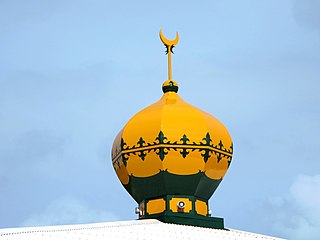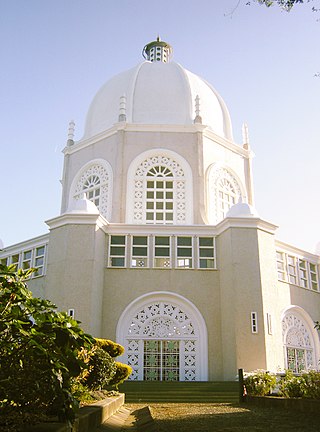Related Research Articles

Christabel Marguerite Alain Chamarette, sometimes Christabel Bridge was a Greens Senator for Western Australia from 1992 to 1996.
James Jupp AM was a British-Australian political scientist and author. He was Director of the Centre for Immigration and Multicultural Studies in the Research School of Social Sciences at the Australian National University and an Adjunct Professor of the RMIT University in Melbourne. He was an Australian citizen and resident of Canberra.

Anne Marie Warner is an Australian former politician who served in the Queensland Legislative Assembly from 1983 to 1995. She was a government minister under Wayne Goss from 1989 to 1995.
The history of the Jews and Judaism in the Land of Israel begins in the 2nd millennium BCE, when Israelites emerged as an outgrowth of southern Canaanites, During biblical times, a postulated United Kingdom of Israel existed but then split into two Israelite kingdoms occupying the highland zone: the Kingdom of Israel (Samaria) in the north, and the Kingdom of Judah in the south. The Kingdom of Israel was conquered by the Neo-Assyrian Empire, and the Kingdom of Judah by the Neo-Babylonian Empire. Initially exiled to Babylon, upon the defeat of the Neo-Babylonian Empire by the Achaemenid Empire under Cyrus the Great, many of the Jewish exiles returned to Jerusalem, building the Second Temple.

Islam in the Cocos (Keeling) Islands is the majority religion. As of the 2016 census, 75% of the population were Muslim.
Montenegrin Australians are Australian citizens of Montenegrin descent.
Danish Australians are Australians with full or partial Danish ancestry. The majority of these people are part of the Danish diaspora.
Argentine Australians are Australian citizens of Argentine descent or birth. According to the Census there were 9,879 Australians who claimed full or partial Argentine ancestry and 20,940 Argentina-born citizens who were residing in Australia at the moment of the census.

Thomas Jerome Kingston Bakhap was an Australian politician. He was born in Ballarat, Victoria, the adoptive son of a Chinese immigrant, Bak Hap. He received no formal education but became a shopworker, and was later a tin miner at Lottah, Tasmania. In 1909, he was elected to the Tasmanian House of Assembly for Bass. In 1913, he transferred to federal politics, winning a Tasmanian Senate seat as a member of the Commonwealth Liberal Party. He was Chairman of Committees from July 1920 to June 1923. Bakhap died in August 1923; John Hayes was appointed to replace him. Bakhap was fluent in Cantonese. He advocated for the Chinese community when Chinese Australians encountered problems arising from the application of the White Australia Policy. He visited China in 1922 as a representative of the Australian government, and by that time was recognised as the parliament's pre-eminent expert in Chinese and South-East Asian affairs.
The World Macedonian Congress is a Macedonian diaspora organization based in Skopje. It presents itself as an organization fighting and demanding for more human rights to ethnic Macedonians on an international level, but is seen as a nationalist or ultranationalist organization by researchers. The organization was registered during the fall of communism, on 15 September 1990 by Todor Petrov, who is also the president of the organization.
In 1975 the first trade union formed in Christmas Island, a territory of Australia in the Indian Ocean, called the Union of Christmas Island Workers (UCIW) representing workers in the island's phosphate mines and administrative workers. During the 1970s and 1980s the UCIW secured wage parity with workers in Australia, rights to Australian citizenship for workers, democratic representation and local government, improved housing and community facilities and promoted community integration. The UCIW is affiliated to the Australian Council of Trade Unions (ACTU).
The Perth Hebrew Congregation is synagogue located in the Perth, suburb of Menora, Western Australia. Established as an organization in 1892, it is the oldest of three shuls and one temple serving the Jewish community in Perth. The synagogue includes a child care - namely Ruth Landau Harp Early Learning offering education to children aged from 6 weeks to 5 years, educating children on the Jewish calendar of events and Jewish values, with all meals being kosher. The synagogue offers facilities for daily services, educational programmes, PHC also houses a library, a mikveh and a bookshop. In July 2004, the shul was heavily defaced with anti-Semitic vandalism.
Singaporean Australians are Australians of Singaporean descent. As Singapore is a multi-racial country, a Singaporean Australian could either be of Chinese, Malay or Indian descent, the main races of Singapore. According to the 2006 Australian census, 39,969 Australians were born in Singapore while 4,626 claimed Singaporean ancestry, either alone or with another ancestry.
Belgian Australians (French: Australiens Belges) are Australian citizens of Belgian ancestry or Belgian-born people who reside in Australia.
The women in Cocos (Keeling) Islands are the female residents of Cocos (Keeling) Islands, a dependency of Australia that can be found in the Indian Ocean. The first known settlers arrived on the islands in 1826.
The Laotian diaspora consists of roughly 800,000 people, both descendants of early emigrants from Laos, as well as more recent refugees who escaped the country following its communist takeover as a result of the Laotian Civil War. The overwhelming majority of overseas Laotians live in just three countries: Thailand, the United States, and France.

The Sydney Baháʼí House of Worship or Sydney Baháʼí Temple is situated in Ingleside, a northern suburb of Sydney, Australia. According to Jennifer Taylor, a historian at Sydney University, it is among Sydney's four most significant religious buildings constructed in the twentieth century. It was the world's fourth Baháʼí House of Worship to be constructed, completed in 1961. Shoghi Effendi, head of the Baháʼí Faith when the House of Worship was designed, called it the "Mother Temple of the whole Pacific area" and the "Mother Temple of the Antipodes." Every year, over 20,000 domestic and foreign visitors frequent the House of Worship.

The Albanian Mosque, also known as the Albanian Islamic Centre Mosque and Albanian Sakie Islamic Centre, is a mosque located in Dandenong, a south eastern suburb of Melbourne, Victoria, Australia. It is one of the earliest mosques in the country.

The Mareeba Mosque, officially known as the Mareeba and District Memorial Mosque, is a mosque located in Mareeba, a rural town in Queensland, Australia. The building contains a minaret, and an adjacent hall used for community functions that houses the library and visitors room. Associated with the Albanian Australian community, the mosque is owned by and the centre of the Albanian Australian Moslem Society.
Kaum Ibu (Women's Group) is a women's rights organisation in the Cocos (Keeling) Islands. In 2001 and 2004 the group was part of consultations on transport and regional services, led by the Government of Australia's Joint Standing Committee on the National Capital and External Territories. The chairperson of the organisation is Danie Olbio.
References
- ↑ Jupp, James (2001). The Australian People: An Encyclopedia of the Nation, Its People and Their Origins. Cambridge University Press. ISBN 9780521807890.
- ↑ Jupp, James (2001). The Australian People: An Encyclopedia of the Nation, Its People and Their Origins. Cambridge University Press.